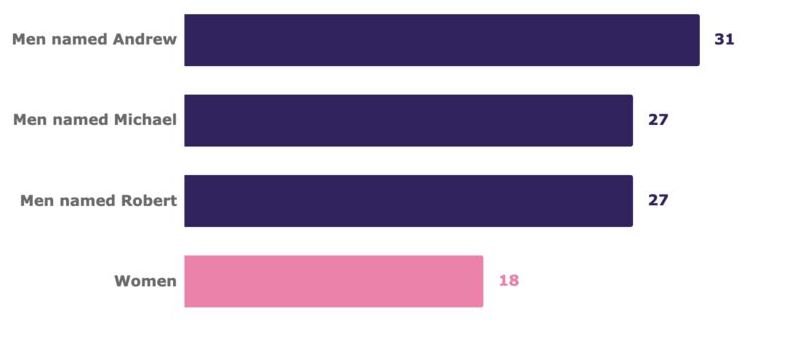What does your choice of words have to say?
At We Are Unity we challenge ourselves to think different. To do work, differently.
We believe in change from the inside out. That’s why we asked our team to share their own experiences with gender bias. More than three-quarters (77%) told us that during their professional careers they had directly experienced gender bias, and nearly everyone (93%) had witnessed it.
In hearing their stories, we saw how language has the power to spur or to spurn. And that our unconscious mind often controls the words we use and how we represent ourselves, and our businesses to the world.
We asked ourselves how we could help shift the dial to contribute meaningfully to the conversation - on International Women’s Day and beyond. Words mattered in our team’s every day experience, so we decided to find out just how much they shaped the corporate narrative at large. We painstakingly analysed every word in the 2021 annual reports of Australia’s top 300 publicly listed companies (ASX300) to see is they spoke volumes.
Gender bias is lurking in your organisation
We found that the vast majority of organisations - 83 per cent - used gender-biased language. That male pronouns were used three times more often than female.
The largest implicit gender bias we detected was in the metals and mining sector (90% of companies). This is followed by oil and gas companies (86%) and software companies (78%).
Those with implicit gender bias in their annual reports were also found to have less social cohesion in the workforce, with less emphasis on diversity and inclusion than their peers.
Unconscious bias is embedded at the top
Of the entire ASX 300, just 30 board Chairs are female. Thats 10 per cent. Representation matters, but it also doesn’t stop there; the words we use set a precedent. In those 300 annual reports, the word chairman appeared 6783 times. Chairwoman just 3 times. And despite the UN, AICD and Diversity Council all backing the gender-neutral term Chair (or chairperson) as the correct title, only 41% of organisations used either title to refer to their top role.
When it came to CEO’s, there are more named Andrew than there are women. Read that one again. 31 leaders of Australian ASX 300 organisations have the first name Andrew. Just 18 ASX 300 CEO’s are female. We also seem to have a penchant for blokes called Michael and Robert (27 of each). Our study identified that the gender-biased language in the annual reports reduced in those with a female lead.
Leaders of ASX300 companies in 2021.
Together we can help close the book on gender bias.
1) Curate your titles. Consider the job titles you use and consciously opt for gender neutral language that levels out the playing field. Despite Chair or Chairperson being the UN, AICD and DCA approved title, only 41% of Australian companies use it in their annual reports.
2) You can’t be what you can’t see. Equitable representation leads to more inclusive spaces. When sharing case studies, staff celebrations, talent recruitment advertisements and impact stories make sure you have a balanced diversity of voices and faces.
3) Check your bias. You can’t break the bias if you don’t recognise it, so make a conscious effort to self-assess. Neutralise your language. Ask your peers for feedback. Put yourself in others shoes. And head on over to
weareunity.com/wordsmatter where you can see more of our analysis and check your own annual report.
It’s a conscious choice, not just today but every day
Unconscious bias burrows deep - in both men and women. Consider gendered words like hysterical, or hag - by using these words you are making a statement. For many of us, we’ve internalised the words and titles (such as chairman) that create a separation between what’s his and what’s her’s, and when we employ that language we perpetuate the cycle, even when we are trying to change it.
Overall, our analysis found gender-balanced and gender-biased reports across each sector and industry in the ASX 300, a clear indication that breaking the bias and building diverse workforces that value all genders - male, female, non-binary or other - is a choice, not a symptom of the demographics of an industry or organisation.


